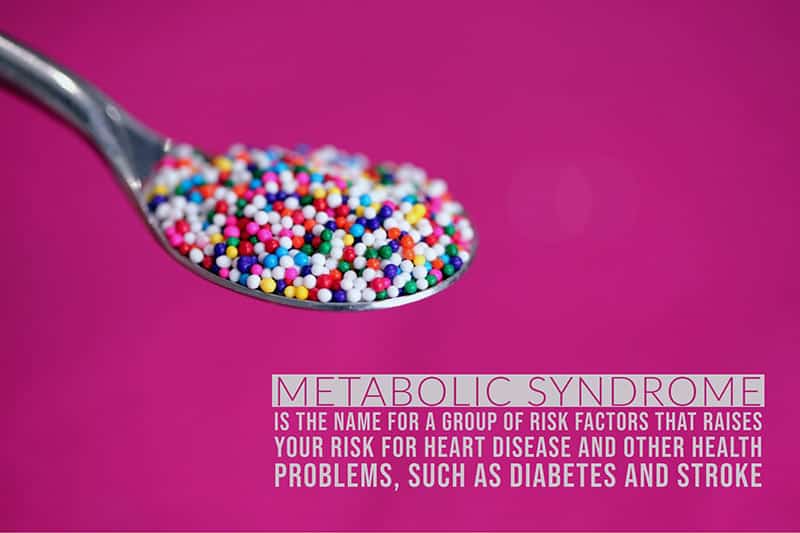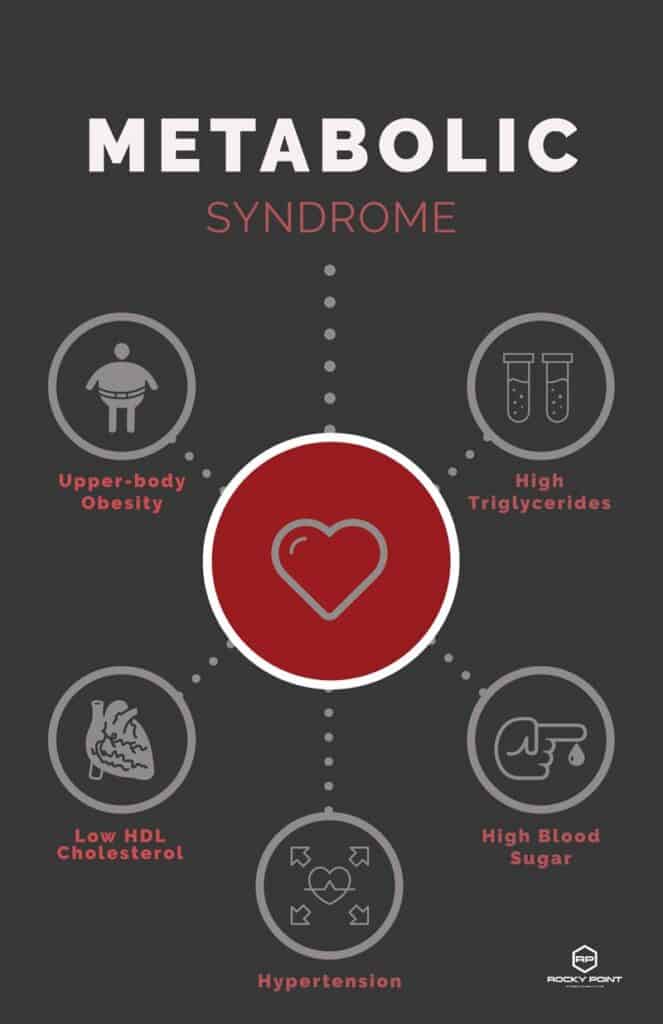What is metabolic syndrome?
Are you suffering from high and low energy levels? How about a large waist circumference relative to the rest of your body? Has your doctor voiced concerns regarding lipid profile or cholesterol?
If you answered yes to any of the above questions, you may be at risk of developing metabolic syndrome.
What is Metabolic Syndrome?
“Metabolic syndrome is the name for a group of risk factors that raises your risk for heart disease and other health problems, such as diabetes and stroke. The term “metabolic” refers to the biochemical processes involved in the body’s normal functioning. Risk factors are traits, conditions, or habits that increase your chance of developing a disease.” – National Heart, Lung, and Blood Institute.
Metabolic syndrome is also referred to as syndrome x, obesity syndrome, hypertriglyceridemic waist, insulin resistance syndrome, and dysmetabolic syndrome.
Why should you care if you have metabolic syndrome?
Metabolic syndrome has a significant association as being a contributing risk factor to virtually all chronic diseases including heart disease, dementia, cancer, arthritis, autoimmune diseases, diabetes, and osteoporosis.
Perhaps of equal importance, it’s extremely unlikely that one will live a long, thriving, and optimal life if they are metabolically unhealthy.

How common is metabolic syndrome?
A recent peer reviewed paper stated that 14.9% of Canadians adults currently have metabolic syndrome. This does not include the hundreds of thousands of adults that have one or two of the five major risk factors associated with metabolic syndrome. It’s scary to think how much of our population is currently metabolically unhealthy, and at serious risk of the development of chronic disease.

How is metabolic syndrome diagnosed?
Below are five common descriptions of metabolic risk factors associated with metabolic syndrome. You can have any one of these risk factors by itself, but they tend to occur together. You must have at least three metabolic risk factors to be diagnosed with metabolic syndrome.
1) A large waistline. This also is called abdominal obesity, upper-body obesity, or visceral obesity. Excess fat in the stomach area is a greater risk factor for heart disease than excess fat in other parts of the body, such as on the hips.
2) A high triglyceride level. Triglycerides are a type of fat found in the blood.
3) A low HDL cholesterol level. HDL sometimes is called “good” cholesterol. A low HDL cholesterol level raises your risk for heart disease.
4) High blood pressure. Blood pressure is the force of blood pushing against the walls of your arteries as your heart pumps blood. If this pressure rises and stays high over time, it can damage your heart and lead to plaque buildup.
5) Elevated fasted blood sugar and insulin resistance. (Mildly high blood sugar may be an early sign of diabetes)
It’s important to note that upper-body obesity is thought to be the driving factor and could be promoting glucose intolerance, hypertriglyceridemia, and hypertension via hyperinsulinemia.
Dr Kaplan wrote a fascinating peer reviewed paper about this in 1989 titled “The Deadly Quartet” (It’s referenced regularly today by many medical doctors and researchers).
In it he presents this “Deadly Quartet” as a single metabolic pathway that begins with increased upper-body obesity and peripheral insulin resistance, and this leads to heart disease, diabetes and hypertension. He notes, in conclusion, that interventions which improve insulin sensitivity—including weight loss via certain diets and exercise—might be the most effective tools to manage and prevent each and all of these conditions.

What can be done about it?
The first line of treatment is through lifestyle interventions. If they don’t seem to be enough, your doctor may prescribe additional medicines.
Unfortunately, the medications currently being prescribed focus on treating the symptoms of the risks factors, not their underlying causes. In other words, their active properties may lower blood pressure, decrease triglycerides, and raise or lower cholesterol but they do not change anything about why these markers of health are abnormal in the first place.
Of course, medication can also come with unwanted side effects too.
Lifestyle changes on the other hand can help prevent, delay, and even reverse many of the risk factors. They tackle the root cause of the problem and can create lasting changes. In saying this, it’s important to recognize that not everyone can implement these lifestyle changes consistently.
If you were diagnosed with metabolic syndrome, it’s imperative to work closely with your doctor, and seek regular medical care and advice.
What lifestyle changes have the biggest impact?
The biggest lever to pull in terms of reducing risk of metabolic syndrome is likely through dietary modifications.
So what should you eat? Dietary intake is currently another topic of healthy debate and has no clear consensus. We must factor age, preference, genetics, and lifestyle choices among other considerations. That said, it’s unlikely that anyone can go wrong with limiting their consumption of processed foods. Specifically, a reduction in processed foods that are rich in simple sugars and linoleic acid is of utmost importance. There are nuances of course and particulars for every individual but if you do nothing else after reading this post, consider limiting your process food intake.
What foods are rich in simple sugars and linoleic acid?
Almost everything in a package will have added hidden sugar and industrial seed oil. I’ve compiled a list of over 50 hidden sugars and artificial sweeteners to help you.
And here is a list of industrial seeds oils and their concentration of linoleic acid.
Keep in mind that while industrial seed oils can be problematic, there are plenty of whole, fresh foods that naturally contain omega-6 fatty acids (linoleic acid), including nuts, poultry, and avocados. They are not necessarily problematic when consumed in moderation. In fact, omega-6 fatty acids are essentially; the body cannot produce them and we must consume them in order to survive and thrive.
The problem lies in the over consumption of omega-6’s as well as the molecule being highly susceptible to oxidation. The industrial treatments that produce seed oils often expose them to excessive heat, oxidation, and chemicals, making them problematic and toxic.
As with anything, moderation is crucial.
What else can you do?
Of course, additional lifestyle factors such as increasing physical activity, maintaining a healthy body weight, quitting smoking, and managing stress all play a pivotal role in the battle against metabolic syndrome.
Get regular exercise, eat balanced meals composed of natural whole-foods and adequate protein, connect with friends and loved ones, and take the time to slow down, be present, and enjoy life.
And here’s some great news! Implementing these lifestyle changes can have a near immediate affect on metabolic health. In as little as 21-30 days you could begin to reverse many of the associated risk factors. Don’t delay, take the first step and make a commitment to one of the suggestions listed above.
Looking for more information or advice?
Below I’ve referenced several medical doctors and researchers that I follow regularly. I also had the pleasure of asking a few of them questions during recent live webinars for my continuing education credits. Consider checking out their research, publications, and websites for more information.
Robert Lustig, MD, MSL
Aseem Malhortra, MD
Paul Saladino, MD
Zoë Harcombe, Ph.D
Sarah Hallberg, DO, MS
Gary Taubes, Scientific Journalist
Jason Fung, MD
William Davis, MD
Ken Berry, MD
Vladimir Subbotin, MD, Ph.D
Robb Wolf, Ph.D
Stephen Phinney, MD, Ph.D
David Diamond, Ph.D
Jeff Volek, Ph.D, RD
Robert E. Ratner, MD, FACP, FACE
Summary
We’ve learned that metabolic syndrome is the name of a group of risk factors that are associated with virtually all chronic diseases.
Conservative estimates indicate that much of our Canadian adult population is at risk of the development of metabolic syndrome, and subsequently, chronic disease.
Defense against metabolic syndrome is best managed through lifestyle interventions.
Diet is likely superior. It should be coupled with other lifestyle habits such as exercise and stress reduction.
I challenge you to create momentum in this very moment by taking action towards improved metabolic health. If you would like our help, please fill out our request a consult form. Together we’ll create sustainable, long-term lifestyle goals that are inspired by your priorities.
Our professional coaches will help you reach your goals one step at a time.
No “quick fix” boot camps, no fad diets, no false timelines. At Rocky Point Fitness you’ll get a gym membership that you actually use and you’ll receive premium high end coaching support that has a track record for producing long-term results.
Fill out the form and request a free consultation today.
– Errol Clark, PPHC, CCFT, CF-L3
About the author:
Coach Errol Clark holds over 12 years of experience as a performance coach and has helped hundreds of clients lose weight, increase strength, improve function, and decrease pain in their lives.
Errol believes in continuing education and constant learning. He is one of the few trainers in North America to successfully complete the Crossfit L3 CCFT designation and the OPEX CCP coaching modules.
Errol specializes in behavioural change and has extensive knowledge in program design. He also has a refined skill set for improving the nuances of functional movement.







